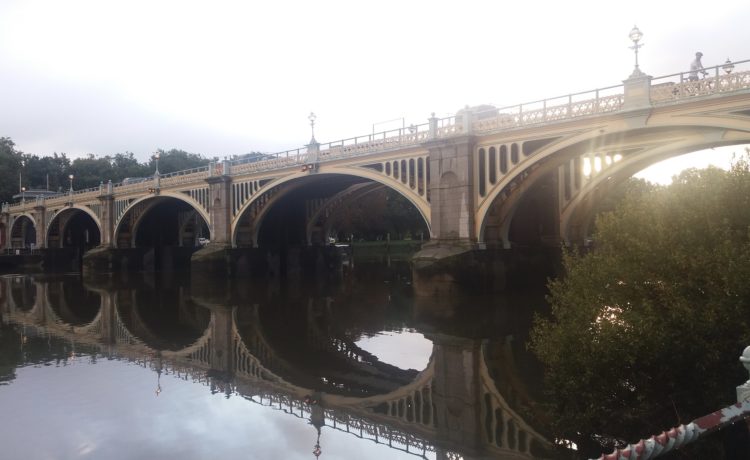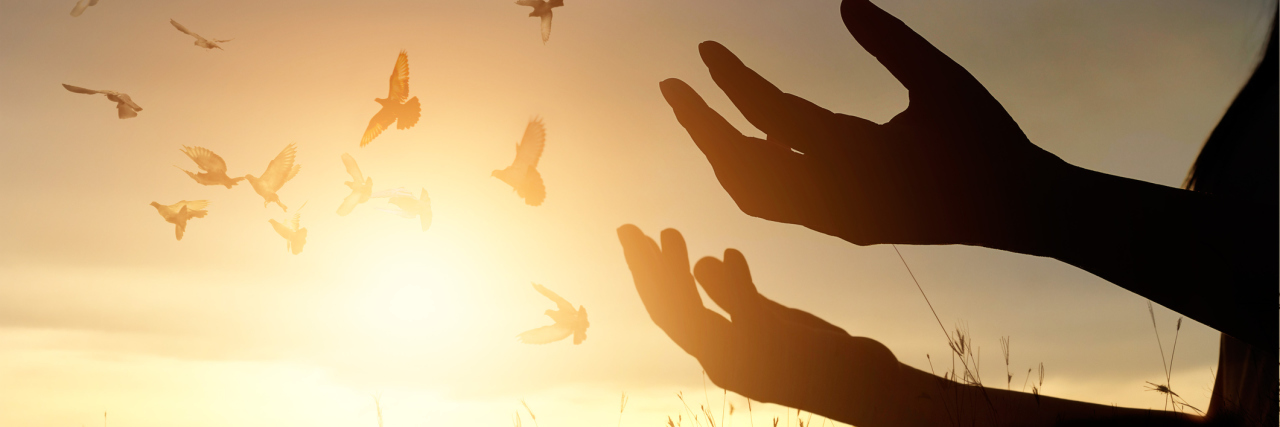Cancer does not end with remission. We have seen too much, experienced and felt too much to just carry on as if nothing has happened. It is as if we have been given a fast-forward taste of our worst nightmare scenario and our own mortality.
I, too, had to work it out, gradually. And over time there is one thing which has become my guiding light.
I am grateful for where I am at and I have worked through my remission guilt. But after cancer treatment I believe we are left with a more intense awareness of our own fragility — a bunch of heightened and difficult emotions like trauma, cancer anger, uncertainty and fear about cancer, health and our life.
Then there are the physical realities of often long-term treatment side effects, as well as financial, social and relational struggles.
I had to make peace with what is at the heart of my cancer experience — the thing I have been left struggling with most: frailty.
When I started to make peace with frailty, things started to change. Let me tell you how.
Let’s start with the dark place.
Whether you have been treated for cancer or any other life-changing, life-shortening or chronic illness, I thnk you will know about the very dark, lonely, hopeless, angry and terrifying place inside of you.
Yours will be different to mine. You may visit yours more or less often, and spend different lengths of time there. For some of us, it may be a more permanent arrangement.
It is the place that holds memories and broken dreams; where we scream and cry, stare at the wall, punch something or someone or ourselves. It is the place no-one else can see, yet we carry it with us, permanently.
At some point I realized this dark place is a part of me, which I cannot deny or get rid of. Given all the difficult and traumatic experiences since my diagnosis, how can I not feel this way? That would be absurd.
For me, it makes sense to have this dark place. And so I decided to accept it and live with it, without letting it harm me. But how?
I need to get to know the dark place.
I started to allow myself to revisit the horror and feel it — very gently. I knew intuitively this was the only way to start putting some ghosts to rest.
After some time I found a pattern running through it all. The emerging theme was frailty and helplessness.
The importance of making peace with my frailty and myself.
I have always been peaceful, but mostly concerned with living in peace with others. Living in peace with myself? Less so, then, but definitely more so, now. Since my treatment for breast cancer in 2012/13, living in peace with myself has become more and more essential to the way I live my life now.
The issue for me is not whether there is a dark place or not. It is about how do I live with it, without being controlled and limited by it.
Because if I don’t, I will remain a bystander while my life moves on towards its end point. I don’t want that. There is enough pain, as it is, even in remission.
I cannot take charge and make the best of the life I have now and carry all that lot with me. I have not got the energy, inclination or time.
I needed to face up to frailty.
The one I had experienced.
The one that has remained.
The one that is yet to come.
I have identified at least five different types of frailty, in me and around me:
1. Physical frailty.
One week before my operation I carried my bicycle up and across a bridge; there were many steps. After my operation I could not cycle because it would have upset the scar. Six weeks later, when I had started chemotherapy, I was unable to climb the same steps without holding onto the bannister and later-on, without holding on to a friend. Now, some years later, I can ride my bicycle but no longer carry it, because of lymphodema in my right arm.

I walk past that bridge every day. It is the single biggest reminder of my shocking and traumatic experience of sudden frailty. And physical frailty and helplessness might happen again, quickly and unexpectedly, faster than the normal ageing process.
I needed to make peace with my ability to become frail and helpless. And I am grateful for the energy I have regained. But I will no longer take it for granted.
2. Emotional and mental frailty.
A cancer diagnosis — the illness itself and treatment that altogether plays havoc with our emotional and mental wellbeing. I experienced huge mood swings and lost confidence in my own judgment. It was as if I did not know myself anymore.
I remember the night after my first intravenous chemotherapy. Suddenly I felt like my body was exploding while my mind was being suffocated. I had a massive panic attack. I think it was when the chemo had finally made its way through my whole body. At least that is how I rationalized it then and now. All I could do was stay calm and wait for the fear to ebb away, which it did.
It was hard work to keep going and hard work to come out of it. I needed crutches and meaning from cancer language like survivor, thriver and cancer journey. Now I feel I have outgrown these metaphors.
I know there is no reason why this level of emotional and mental frailty cannot happen again. I had to make peace with that experience. I managed it then and will manage again. For now, I have to let it go.
3. Relationships and people are frail.
Crisis teaches you who is there for you. In my case, some people were, but not many. And of those who were there, not all helped me in a way that was helpful. Others of whom I expected it the least came to my aid, sometimes without me needing to say anything. I have made friends and I have lost friends.
People around me were affected by my cancer in different ways. I felt bitter and disappointed.
I had to make peace with that disappointment and let it go because each time I thought of it, a toxic emotional wave moved across my heart. A crisis shows us how much others can cope with. We all have our thresholds — me included — and I am careful with new friendships and relationships I form.
4. Financial and social frailty.
I don’t know about you, but I am not rich. I make ends meet. Illness, when you are in it and afterwards, costs money. And I do not just mean treatment. In some countries, some (not always all) cancer treatment is paid for by the state. That’s what happened to me (in the UK). But I felt I needed a lot more support, which I had to and continue to self-fund.
I was left unemployed with very little money coming in and eventually had to start from scratch. I felt brutally stripped of my social status and value. My abilities and achievements no longer mattered to others and to me. I felt very insecure.
I had to make peace with this experience, too. I have learned a lot more about cancer support services and have decided to be more proactively prepared for if or when my health deteriorates.
5. Spirital frailty.
I believe when we are at crisis point, we can be forgiven for wondering what it is all about. We may doubt a lot of what we may have believed in. I do not just mean religion, but our values, principles, purpose and identity. This can be frightening, lonely, cold and dark.
I had to make peace with my questions and the new answers I have settled for. I am no longer who I was before. I have grown. And so it makes sense to re-evaluate my principles and beliefs. Because I need to remain authentic, grounded in and guided by integrity. For me this is about my spirit and my soul.
Making peache with my frailty: What difference has it made?
I am putting myself first.
I was not brought up to put myself first. I was brought up to think of it as bad manners and selfish. The concepts of entitlement and even self-care did not exist in our vocabulary or in our family ethos. All my life I have been focused on being fair to others. But now I know I had learned very little about being fair to myself, and about protecting my own needs.
Now I know that self care, pacing myself and looking after myself is essential to my physical, mental, emotional and spiritual wellbeing.
I cannot do it all and perhaps, never should have tried, at the expense of my own well-being.
Now I no longer take on too many responsibilities and obligations. I need to have as much freedom as possible to manage my energies. This has affected the way I earn a living and the way in which I socialize. This is hard, when we have people genuinely depending on us, like children or aging relatives.
But for the sake of my own well-being, I have had to make choices. I am clear about them to others who are impacted by them.
There are no false or misleading expectations.
Equally, I do not want to become a burden on others who may not want to or are incapable of taking care of me, in a manner I want and need.
Frank and sobering conversations have taken place, and I needed to make peace with my discomfort over standing up for my own interests. But in the long-run, we all will benefit from this clarity.
Life is uncertain. It has always been. And it will always be.
I do not know what it will feel like if/when the cancer returns, or I fall ill some other way, or when I die.
For me, cancer is too unpredictable to feel reassured with the passage of time. That is the way I choose to look at it.
I had to make peace with my view on cancer and I am not apologizing for it. I am aware I am walking a fine line between negativity and realism. I keep monitoring myself to make sure my realism does not turn into irrational fear.
Because then, I am back to the dark place, where I do not want to get stuck.
Because if I do, then I will not have the energy or inclination to do what I can do best and like the most — to think and to feel and to express what I find and to share my voice — like now, with you.
Having made peace with frailty — my own and that of others — has started to lighten my load. I have grown in confidence. And I trust deep down, whatever lies ahead, I will feel stronger and more grounded and peaceful, than I was before.
It is a process and attitude which will evolve until I die.
But knowing what I know now — feeling more at ease and at peace with myself and the meaning I have given to some traumatic cancer experience — that makes me feel stronger, more resilient and less frightened of the future.
We want to hear your story. Become a Mighty contributor here.
Thinkstock photo by ipopba

